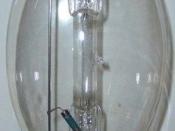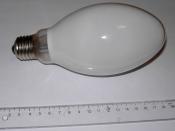As anyone who has ever broken a thermometer can agree, Mercury is a very interesting substance. Named after the second planet of our solar system, Mercury has been used in thermometers, barometers, electrical devices, etc. Mercury is rarely found out in the open, but an unknown discoverer obtained Mercury from cinnabar ore in Egypt in about 1500 BC. Mercury is member of the transition metals, and is a poor conductor of heat, but a fair conductor of electricity.
Mercury is very dangerous. In fact, it's toxic. Mercury vapor creates bright colorful lights, but prolonged exposure to it can cause vital harm to the central nervous system. Mercury shows no signs of toxicity, as it is odorless and tasteless. The symbol for this element is Hg originating from the Latin word hydrargyrum (liquid silver). In my slogan, Hg stands for "Hazardous Gas" which represents vapor from Mercury. And it is true that you shouldn't mess with Mercury.
Your skin or any other body parts should never come in contact with it.
As number 80 on the periodic table of elements, Mercury is classified as a metal but is actually a liquid at room temperature. Although Mercury is a liquid, it isn't wet. It has a negative surface tension (where the meniscus is actually placed upside-down) so it acts as the oil does when you're mixing a cake (where the oil slides off leaving everything dry).
As metallic silver in color, Mercury's melting point is 234.28 K. The boiling point is 629.73 K. Mercury is very dense. At the density of 13.456 g/cm3 at 293 K, Mercury is so heavy that objects such as bricks, cannonballs, and lumps of lead and iron will float in it. An interesting fact about Mercury is that Gold will dissolve in it. Mercury is mainly...


